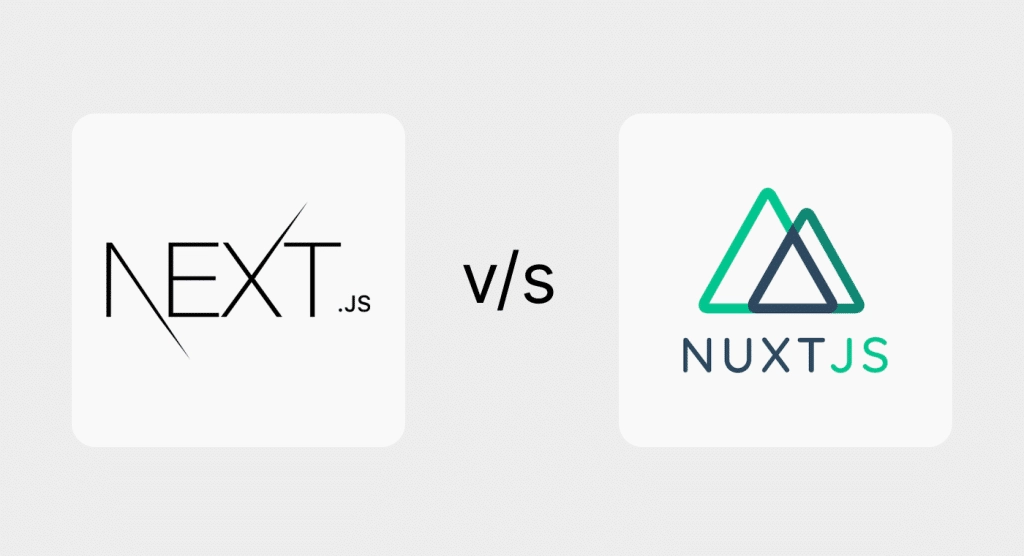
Next.js vs Nuxt.js: A Developer's Guide to Choosing the Right Framework
An in-depth comparison of Next.js and Nuxt.js from a developer's perspective. Learn when to choose each framework based on team skills, project requirements, and long-term goals.
As a developer who has worked extensively with both frameworks, I'm often asked: "Should I use Next.js or Nuxt.js for my project?" The answer isn't straightforward, and it depends on several factors that go beyond just personal preference. In this comprehensive guide, I'll share my insights on both frameworks to help you make an informed decision.
The Foundation: React vs Vue
Before diving into the specifics, it's crucial to understand that your choice often starts with the underlying JavaScript framework:
Next.js is built on top of React, bringing structure and powerful features to the React ecosystem. If you're already comfortable with React's component-based architecture and JSX syntax, Next.js feels like a natural evolution.
Nuxt.js leverages Vue.js, offering a more opinionated approach with conventions that can speed up development. Vue's template syntax and reactive data system provide a different developer experience that many find more intuitive.
Development Experience: Where They Shine
Next.js: Flexibility with Power
Next.js excels in giving developers granular control over their applications. Here's what I appreciate most:
- Incremental adoption: You can start with a simple React app and gradually add Next.js features
- Versatile rendering: Choose between SSR, SSG, ISR, or CSR on a per-page basis
- Rich ecosystem: Leverage the vast React ecosystem with seamless integration
- Enterprise-ready: Built-in TypeScript support and robust production features
Nuxt.js: Convention Over Configuration
Nuxt.js takes a different approach, focusing on developer productivity through smart defaults:
- Zero-config routing: File-based routing that just works out of the box
- Unified architecture: Consistent patterns across server and client code
- Integrated tooling: Built-in state management, middleware, and plugins
- Developer-friendly: Auto-imports and helpful error messages
Performance: The Numbers Game
Both frameworks deliver excellent performance, but they achieve it differently:
Next.js Performance Highlights:
- Automatic code splitting at the page level
- Built-in image optimization with the
next/imagecomponent - Edge runtime support for ultra-fast API routes
- Advanced caching strategies with ISR
Nuxt.js Performance Highlights:
- Intelligent bundling with automatic tree-shaking
- Built-in performance monitoring and optimization hints
- Hybrid rendering modes for optimal delivery
- Efficient hydration strategies
In my experience, both frameworks can achieve similar performance metrics when properly configured. The difference often comes down to how much optimization work you want to do manually versus relying on framework defaults.
SEO and Meta Management
Both frameworks excel at SEO, but with different approaches:
Next.js provides the next/head component and the newer App Router with layout-based meta management. You have full control over how meta tags are generated and managed.
Nuxt.js offers a more integrated approach with the useSeoMeta composable and automatic meta tag generation. The framework handles many SEO best practices by default.
Learning Curve and Team Considerations
For React Developers
If your team is already proficient in React, Next.js offers a smoother learning curve. The concepts translate directly, and you're building on existing knowledge.
For Vue Developers
Similarly, if your team knows Vue.js, Nuxt.js will feel familiar. The composition API and reactive patterns carry over seamlessly.
For New Developers
Nuxt.js might have a slight edge here due to its convention-over-configuration approach. New developers can be productive faster without needing to understand all the underlying complexity.
Deployment and Hosting
Next.js has excellent deployment options:
- Vercel (made by the same team) offers seamless integration
- Netlify, AWS, and other platforms provide robust support
- Self-hosting is straightforward with good documentation
Nuxt.js also offers solid deployment options:
- Nuxt Cloud provides specialized hosting
- Universal deployment adapters for various platforms
- Static generation works well with any CDN
Community and Ecosystem
Next.js benefits from:
- Larger community due to React's popularity
- Extensive third-party library support
- Regular updates and active maintenance
- Strong enterprise adoption
Nuxt.js offers:
- Passionate and growing community
- High-quality modules and plugins
- Excellent documentation and learning resources
- Strong focus on developer experience
When to Choose Next.js
Consider Next.js when:
- Your team has strong React experience
- You need maximum flexibility and control
- You're building a complex, large-scale application
- You require advanced features like edge computing
- SEO is critical and you want fine-grained control
When to Choose Nuxt.js
Consider Nuxt.js when:
- Your team prefers Vue.js or values convention over configuration
- You want to move fast with reasonable defaults
- You're building a content-heavy site or blog
- You prefer integrated solutions over piecing together tools
- You want excellent developer experience out of the box
My Personal Recommendation
After working with both frameworks extensively, I believe the choice should be primarily driven by:
- Team expertise: Use what your team knows best
- Project requirements: Match the framework to your specific needs
- Long-term maintenance: Consider who will maintain the codebase
Both frameworks are excellent choices that will serve you well. Next.js gives you more control and flexibility, while Nuxt.js provides a more streamlined development experience.
The Bottom Line
There's no universal "better" choice between Next.js and Nuxt.js. Both frameworks solve similar problems but with different philosophies. Your decision should be based on your team's skills, project requirements, and long-term goals.
The most important factor is choosing a framework that your team can work with effectively and that meets your project's specific needs. Both Next.js and Nuxt.js are mature, well-supported frameworks that can power successful web applications.
What matters most is starting with either framework and focusing on building great user experiences. The framework choice, while important, is just one piece of the puzzle in creating successful web applications.
What's your experience with Next.js or Nuxt.js? I'd love to hear your thoughts and experiences in the comments below.